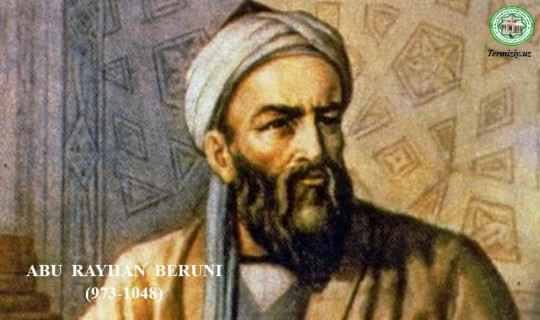
ABU RAYHAN BERUNI
Abu Rayhan Beruni was a great multifarious genius of the Middle Ages. At the same time, he was an astronomer, astrologist, mathematician, geologist, geographer, researcher of local lore, biologist, doctor, plant-grower, mineralogist, historian, textual critic, expert in religion, philologist, philosopher, sociologist, expert in logic, theologian and poet. They say that it was easier to count the number of branches of science in which he was not engaged than those he had been engaged in. Beruni wrote books dealing with astronomy, astrolabes, geodesy, mineralogy, pharmacognosy, geography, astrology, toponymics, religion and history.
In the structure of his name Abu Rayhan Muhammad ibn Ahmad Beruni “Abu Rayhan” means Rayhan’s father, “Muhammad” is his own name, “ibn Ahmad” means “Ahmad’s son”, and “Beruni” is his penname.
Beruni was born on September 9, 973 in Kot (Kat), the ancient capital city of Khoresm. Some sources say that Beruni was born in the suburbs of the city of Kot and therefore he was known as “Beruni” meaning “from outside of the city”.
A well-known historian Abu Sa’dAbdulkarim as-Sam’ani (died in 1165) wrote the following lines in his book “A Book of Ancestors”: “The penname “Beruni” is used with the names of those people who were bom outside the territory of the city because the word “Beruni” means the territory outside the city of Kot. The astronomer al-Beruni is famous for this penname”.
At that time, the city of Kot was the central city of Khoresm, the capital of the Afrighi dynasty of the 10th century and one of the main trading centers of Central Asia. Trade, economic and cultural relations with Iran, India, China, Near East and the countries of the Caucasus were flourishing. The Khoresmis exported mainly fur, cattle, fish and products of craftsmanship. They imported from China ceramics and silk, and from India different sorts of spices. Tradesmen from Europe, Rome and Syria brought different products of craftsmanship and jewellery. Pottery, glass making jewellery, textile and broidery on wood, as well as such sciences as mathematics, astronomy, geodesy and other branches of science were rather developed in Khoresm. Historical sources inform us that people who were interested in these branches of science came to Khoresm from different corners of the world and studied there. One could see people from China, Syria, Rome, even from Andalusia (Spain), Greece and other countries. They came here not only to study but also to disseminate their knowledge in this country. The facts say that the possibilities to study and get knowledge were rather wide in Khoresm. Beruni grew up under such positive conditions.
Beruni spent his whole life in the search of knowledge and education. Even at the last minutes of his life, he was inclined to get some knowledge that he felt necessary for him. A historian YaqutHamavi provides the following story from the tongue of Beruni’s closest friend Judge Valvaliji: “I entered the room he was lying and getting his last breath. He asked me: “Tell me your ideas about dividing the heritage between litigants”. I was very touched by his words and said: “In such a condition?” He said: “Hey, my friend! Don’t you think that it is better to leave the world knowing the matter I feel needy, than not knowing it?” And then he made me tell him my thought about the matter he had asked for. I did so and he kept it in his mind. Then he told me his opinion about the matter we had discussed and then I left the room. As soon as I came out of the house, I heard a bitter cry which informed me that the scholar had left the world”.
Beruni supported justice and mercifulness. The scholar provides the following story about this matter: “Caliph Umar ibn Abdulaziz heard that his son Abdullah had bought a ring with a piece of precious stone for a thousand dirham (a kind of currency) and wrote a letter to him saying: “According to the information which reached me, you have bought a ring. I advise you to sell it immediately and with this money feed a thousand hungry people. For yourself order a silver ring with its stone made of silver”. Abdullah acted as his father had said”.
A man asked Beruni to teach him something that would bring a profit. The scholar took the book titled as “A Book of Signs” by al-Kindi and wrote him the component parts of a drug prepared from very sharp and acute ingredients. If it was mixed with water and then dropped on a mineral stone, there would appear a white writing. Having learned the secret of this drug, the man began to write the names of saints as “Muhammad” or “Ali” and cheated ordinary people that this name had been scraped on a sacred stone and thus earned dishonorable money. Beruni regretted that he had taught the secrets of chemistry to such a dishonest person and begged the God to forgive him for his deed and stated that teaching the science to those who would use it for his own biased purposes would be equal to share his guilt.
An English orientalist J. Sarton stated that “Beruni was the Leonardo da-Vinchi of the 9th century”. As an answer to this comparison, the Academician S. Tolstov wrote that it is impossible to accept such a comparison because we cannot call Ptolemy as “the Beruni of the 2nd century”. Therefore, it would be correct to call Leonardo da-Vinchi “the Beruni of the 16th century. European specialists engaged in the activity of Beruni pointed out that Beruni alone had done such a great amount of scientific research works that could not be done even by a whole research institute.
The scientific legacy of the scholar Abu RayhanBeruni on natural sciences was also studied to some extent during the reign of the former Soviet regime but it was studied from the materialistic point of view. The independence gained by our country made it possible to study Beruni’s scientific legacy, especially his attitude towards the Holy Qur’an and Hadiths as well as the religious orders and their teachings. Nowadays the specialists in these fields of science are investigating them and searching Beruni’s those books which are not currently available for us. Some years ago, our country celebrated the 1000th anniversary of Ma’mun Academy of Sciences in Khoresm in an international scale where the service of the scholar in this field was highly appreciated. A special scientific expedition was also sent to Ghazni to visit and restore the graveyard and tomb of Beruni. Research works stating Beruni’s contribution to the world science are now being written and published and further researches are going on. A number of publications depicting the unknown and unlearned sides of Beruni’s scientific legacy are being printed. All of these may be considered as one of many examples of favorable deeds in the way of immortalizing the name of this world-known scholar and genius.
✍️Farrux Saydullaev,
International scientific research centre of
Imam Termizi Head of International Relations
 УЗ
УЗ
 РУ
РУ
 EN
EN
 العربية
العربية
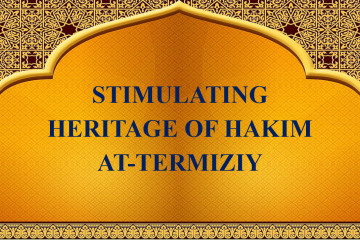
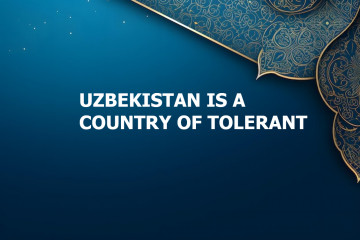
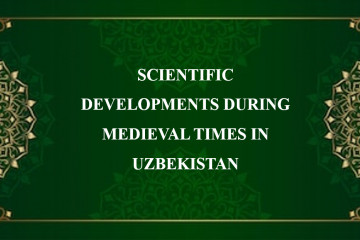
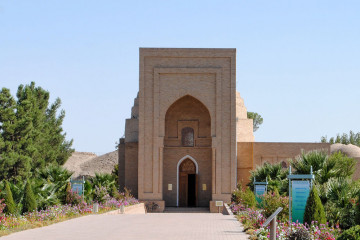
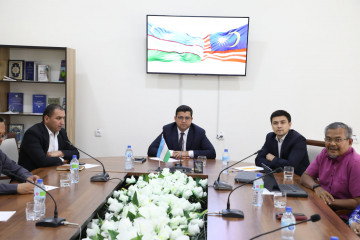

Оставить комментарий